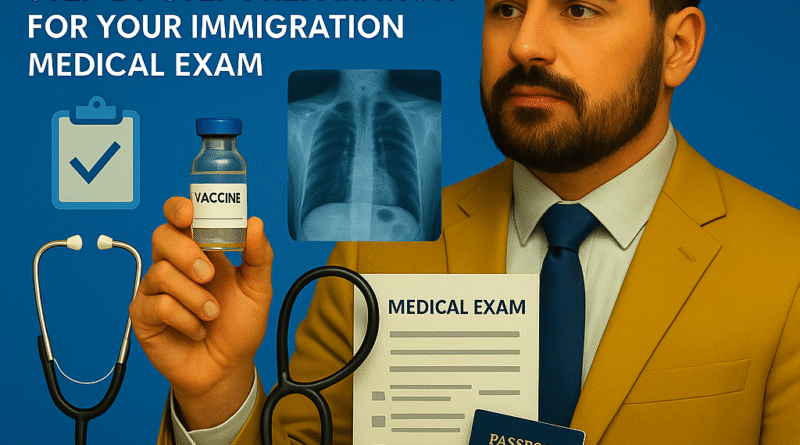Designated Panel Physicians: Step-by-Step Preparation for Your Immigration Medical Exam
What a panel physician is and why the visit matters
Designated panel physicians are doctors and clinics approved by the U.S. Department of State to conduct immigration medical examinations for immigrant visas (and certain nonimmigrant categories). They follow CDC Technical Instructions that are uniform worldwide—meaning the panel physician is not “your doctor,” but a neutral examiner who verifies you are medically admissible and properly vaccinated. The exam’s results are sent to the consular post (often via eMedical), and the validity period of the medical exam directly impacts how long your immigrant visa can be issued for (commonly up to 6 months from the exam date; special TB classifications may shorten this).
Key idea: The panel exam is evidence-based, not a negotiation. If your documents are complete and your health information is transparent, the process is usually straightforward and quick.
Scope of the examination
- Medical history review and physical exam (vital signs; systems review).
- Laboratory tests required by CDC for age groups (e.g., syphilis and gonorrhea screening for adults, as applicable).
- Tuberculosis screening using IGRA/TST and chest radiograph protocols depending on age and risk.
- Verification and administration of vaccinations required under U.S. immigration law (e.g., MMR, varicella, Td/Tdap, influenza seasonally, hepatitis B in relevant cohorts, COVID-19 as required by current CDC instructions).
How to book and confirm the right clinic
Find the official list first
- Use the embassy/consulate website for your country and search “panel physicians.” Book only with clinics on that list.
- Confirm what identifiers the clinic needs (CEAC case number, passport number, NVC invoice ID) and whether it uses eMedical (most do).
Timing your appointment
- Many posts advise scheduling the exam 5–10 business days before the interview to allow lab results to post. Some clinics require longer for TB workups.
- If you have a complex medical history (TB treatment, recent surgery, chronic conditions), book earlier and bring documentation to prevent a deferral.
Payment & logistics: Fees vary by country and are typically paid at the clinic. Ask about accepted payment methods, whether passport photos are required, and if children need separate slots. Clarify if vaccines are billed separately.
What to bring (documents and health records)
Identity and case materials
- Passport (valid and not damaged).
- Interview letter or appointment confirmation (if already issued).
- CEAC/Case number; DS-260 confirmation page (helpful but not always required).
- Local ID as requested by the clinic (if applicable).
Medical history and proof of vaccines
- Immunization records from childhood to present (yellow card/booklet, clinic printouts). Even partial records help determine what you still need.
- Past TB evaluations: IGRA/TST results, chest X-rays, or treatment completion records (DOTS documentation if treated).
- Letters from treating physicians for chronic illnesses (e.g., diabetes, epilepsy, heart disease), with medication lists and dosages.
- For prior COVID-19 vaccination: recognized vaccine card/record; for prior illness, bring test or medical documentation if relevant to local policy.
- Women who are pregnant: prenatal card and physician letter. You may defer the chest X-ray with a signed waiver; however, visa issuance may be delayed until X-ray is completed.
Translations and copies
- Bring certified translations for non-English documents if the clinic requires them (check instructions). Keep copies for your records.
Vaccinations: how the panel decides what you need
Panel physicians follow CDC’s age- and risk-based tables. You don’t need to “guess” vaccines—bring proof and the clinic determines gaps. If a vaccine is medically contraindicated or not age-appropriate, the doctor records a waiver code (e.g., “A” for not age appropriate, “C” for medically contraindicated). If a vaccine is unavailable locally, the record will reflect this with an appropriate code. You should not be penalized for supply shortages, but you may be advised to complete series after entry.
Faster exam
Add shots on site
More vaccines + longer visit
After the visit: your vaccination documentation
You will receive a vaccination documentation worksheet (or digital equivalent in eMedical). Keep a copy; it is useful later for U.S. school/work and for Adjustment of Status if needed.
TB, syphilis, and gonorrhea screening: what to expect
Tuberculosis (TB)
- Children and adults follow age-specific protocols (IGRA/TST; chest X-ray when indicated). If TB disease is suspected, additional tests and treatment may be required before the visa can be issued.
- Some TB classifications (e.g., certain Class B findings) can shorten medical validity (often to 3 months). Plan travel accordingly.
Syphilis and gonorrhea
- Adults in specified age brackets are screened. Positive results require treatment per CDC protocols and can delay visa issuance until documented as resolved or adequately treated.
Practical prep: make the day smooth
Before you go
- Sleep well, hydrate, and eat a light meal unless instructed to fast. Bring eyeglasses if you wear them.
- Do not falsify records or omit conditions; inconsistencies can create delays or findings that require further review.
- Confirm whether children need separate appointments and consent forms.
At the clinic
- Expect registration, photo capture, vitals, medical history, lab draw/urine, vaccinations, and imaging (if indicated). Total time varies from 1–3 hours for routine cases.
- Ask when results will be sent to the consulate and whether you will receive a copy or sealed envelope to bring to the interview (some posts are fully electronic and do not give sealed packets).
Interview-readiness checklist from the medical side
- Passport and interview letter match the clinic submission.
- Vaccination worksheet received and legible.
- Any required follow-up tests or treatments booked (and evidence of completion ready for interview).
- If pregnant and X-ray deferred, understand that visa issuance waits until X-ray is completed or the post’s policy is satisfied.
Special scenarios that often cause delays
Prior TB treatment or abnormal chest X-ray
Bring all prior imaging and treatment records. Without documentation, clinics may have to restart the diagnostic pathway, adding weeks.
Chronic conditions and medication lists
Write down drug names (generic), dosages, and frequency. For conditions like epilepsy or diabetes, a short letter from your physician describing stability and control can prevent unnecessary deferrals.
Vaccination contraindications
If you have allergies, pregnancy, or other contraindications, request a medical letter in advance. The panel physician will code the exemption appropriately under CDC rules.
Understanding validity and how it affects visa issuance
Most clean medicals allow the consulate to issue an immigrant visa valid for up to six months from the exam date (or from the medical clearance date for certain TB evaluations). If you complete the exam too early and then face scheduling delays, you may lose validity time. Conversely, scheduling too late risks insufficient time for lab results before the interview.
Balanced window
Risk labs not ready
Lose visa validity
Conclusion
Preparing for a designated panel physician exam is about organization and transparency. Book only with clinics listed by your post, bring complete identity documents and any medical history you have, and expect standardized screening for TB, syphilis, and gonorrhea plus vaccine verification. The fastest path is simple: good records in, clear results out. Plan your appointment to balance laboratory turnaround with visa validity, and clarify whether results are electronic or sealed. With the right preparation, the panel exam becomes a predictable checkpoint—one that moves you toward your interview and visa issuance without surprises.
Important: This article is general information and does not replace personalized advice. Always rely on your consular post’s instructions and the panel clinic’s guidance. For medical questions, consult your licensed physician; for case-specific immigration strategy (timing, validity, special conditions), consult a licensed U.S. immigration attorney. Professional guidance is essential to address unique health histories and ensure compliance with current CDC Technical Instructions.
- Purpose: Neutral medical screening for immigrant visas under CDC Technical Instructions; results go to the consulate (often via eMedical).
- Book correctly: Choose a clinic from your consular post’s official panel list only. Confirm fees, eMedical use, and lead times for labs/X-ray.
- Timing: Aim for the exam ~5–10 business days before interview (earlier if complex history or TB workup likely).
- Bring: Passport, interview letter/CEAC number, immunization records, prior TB tests/X-rays, medication list & dosages, physician letters for chronic conditions; certified translations if required.
- What happens: History + physical, TB screening (age/risk-based), syphilis/gonorrhea tests as applicable, vaccine review and catch-up shots as needed.
- Validity: Most clean medicals allow visa validity up to 6 months from exam/clearance; certain TB classes may cut this (often to 3 months).
FAQ
How do I verify a doctor is an official panel physician?
Use the U.S. embassy/consulate website for your country and open the “panel physicians” page. Book only clinics on that list; third-party directories can be outdated.
Which vaccines are required and what if I lack records?
Requirements follow CDC age/risk tables (e.g., MMR, varicella, Td/Tdap, seasonal influenza, hepatitis B cohorts, and current COVID-19 policy). Bring any proof you have; the panel will identify gaps and administer needed doses or record valid waivers (e.g., not age-appropriate, medical contraindication, unavailable).
Can pregnancy or medical conditions change the exam?
Yes. Pregnant applicants may defer the chest X-ray with a signed waiver (which can delay visa issuance). Chronic conditions aren’t disqualifying by themselves—bring a physician letter describing stability, meds, and follow-up to avoid deferrals.
When should I schedule the exam relative to my interview?
Commonly 5–10 business days before the interview so labs post in time. Too early can waste visa validity; too late risks results not arriving by interview day.
Will I receive a sealed envelope or digital confirmation?
Many posts use eMedical and send results directly; some still give a sealed packet. Ask the clinic and keep your vaccination worksheet copy for U.S. use later.
- CDC Technical Instructions — global standards panel physicians must follow (TB algorithms, STI screening, and vaccination tables).
- Department of State (DOS) — designates panel physicians, manages CEAC/eMedical intake, and sets post procedures.
- Visa validity linkage — immigrant visa validity typically tied to medical exam/clearance date; TB classifications can shorten validity windows.
- Post instructions — each consular post publishes its panel list, fees guidance, document lists, and whether sealed packets are still used.
- Waiver coding — vaccination exceptions recorded with standardized codes (e.g., “A” not age-appropriate, “C” contraindication, “N” not routinely available).
- Data handling — results transmitted securely (often eMedical); applicants should retain copies of vaccine documentation for schools/employers in the U.S.
Always consult your post’s latest web page; local requirements (photos, payment methods, translation rules) change without broad notice.
Final considerations
Preparation is largely administrative: verify the clinic from the official panel list, time your appointment to balance lab turnaround and visa validity, and bring comprehensive records—especially vaccination proofs, prior TB documentation, and clear medication lists. Be transparent about medical history and follow clinic directions precisely; clarity and completeness are the fastest way through the exam.
Important: This guide is for general information and does not replace professional advice. For health questions, consult your licensed physician; for immigration strategy (timing, validity windows, special circumstances), consult a licensed U.S. immigration attorney and follow your consular post’s official instructions. Individual facts can change requirements and outcomes.

